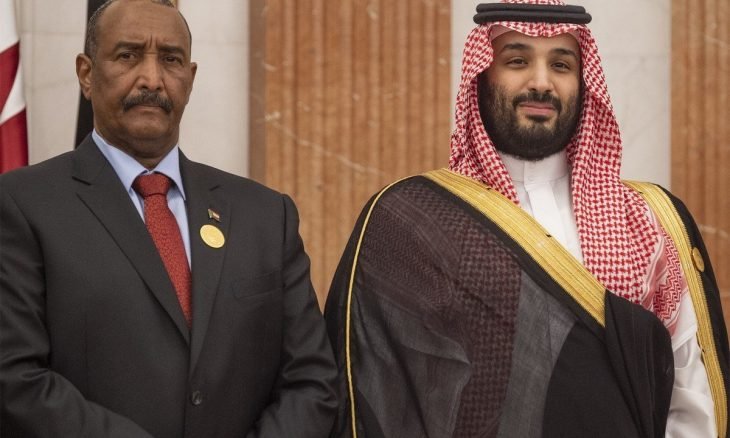
The internal conflict in Sudan has become a proxy war between Saudi Arabia and the United Arab Emirates (UAE) as part of their regional rivalry for external influence.
With the fighting in Sudan now entering its third month with no signs of abating, Foreign Policy magazine has reported that the conflict between rival generals is not just an internal dispute but extends to competition between the UAE and Saudi Arabia to enhance their regional presence.
The magazine noted that several ceasefire agreements in Sudan had been violated by both General Abdel Fattah al-Burhan, the head of the army, and his rival General Mohamed Hamdan Dagalo, known as “Hemedti,” the commander of the Rapid Support Forces.
The magazine highlighted the significance of Sudan in the region, stating that it is a “bridge connecting the Middle East and Africa, and its abundant natural resources mean that the battle for Khartoum has taken on a regional dimension.”
It pointed out that Saudi Arabia and the UAE view the war in Sudan as an opportunity to solidify their dominant positions in the Middle East. While Saudi Arabia supports Burhan, the UAE backs Hemedti.
According to the magazine, given the international legitimacy of Burhan, the chances of the Rapid Support Forces triumphing over the Sudanese army are slim.
According to the magazine, it is more likely that Burhan and Hemedti are establishing competing spheres of influence in Sudan that mirror the situation in Libya, where continued competition between various political and military factions has resulted in a fragmented state with multiple centres of power.
In such a scenario, the magazine stated that the Rapid Support Forces would challenge Burhan and his external supporters, giving the UAE additional influence in the country’s future and helping Abu Dhabi establish itself as an emerging prominent power in the Gulf.
According to the magazine, Riyadh and Abu Dhabi, both members of the Gulf Cooperation Council, were apparent allies for decades. Still, their current relationship has become entangled in a competition for escalating regional dominance.
It noted that in recent years, Saudi Arabia and the UAE have sought to expand their competition to include Africa, particularly Sudan, with its strategic location and abundant resources.
According to the magazine, the Gulf states have played a significant role in Sudan since the ousting of Omar al-Bashir. Abu Dhabi and Riyadh immediately backed the Transitional Military Council that assumed power, providing approximately $3 billion in aid.
At that time, Saudi and Emirati interests in Sudan generally aligned, the magazine stated, as both played a role in the short-lived democratic transition in the country.
Saudi Arabia cooperated with Egypt in supporting Burhan. At the same time, the UAE worked with Russia to support the Rapid Support Forces through the quasi-military Wagner Group, which has been active in Sudan since 2017 when it signed contracts with the country’s Ministry of Resources for projects in Darfur, where the Rapid Support Forces are active.
Reports indicate that Hemedti acts as a guardian of Emirati interests in Sudan, particularly in protecting gold mines controlled by the Wagner Group, as gold from these mines is shipped to the UAE en route to Russia.
Therefore, the magazine concluded that “the fall of Sudan under the control of either Burhan or Hemedti and thus either Saudi or Emirati spheres of influence would change the balance of power in the Gulf and escalate tensions between Riyadh and Abu Dhabi. However, the war’s outcome is unlikely to be as clear-cut, and a scenario similar to Libya is expected, where Sudan will be divided into different power zones, possibly based on ethnic and tribal affiliations.”